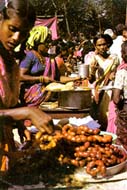Have a Ball... But Be Careful, Friend
... A travel health advisory for Goa
Jose Colaco, MD
 Goa is one of the most popular tourist destination in the world.
Most Goans who visit India will visit their families in Goa and stay
in the villages, which are still, clean, peaceful and beautiful
places to be in. The following advice is more relevant to the
Goan visitor who is returning home for a holiday. And, of course, the tourist. Goa is one of the most popular tourist destination in the world.
Most Goans who visit India will visit their families in Goa and stay
in the villages, which are still, clean, peaceful and beautiful
places to be in. The following advice is more relevant to the
Goan visitor who is returning home for a holiday. And, of course, the tourist.
Most Goans will be travelling via Bombay. The first sight of
this city is an unnerving and a shocking experience. Expect it to
be extremely crowded, dirty and polluted. The Sahar International
Airport could have been cleaner. The domestic airport in Bombay
is better than the international one. The road connecting the
international and domestic airports is a total eyesore. It will
help to be mentally prepared for the absolute filth, abject poverty
and pollution of Bombay.
Visitors to Goa should try and avoid a stopover in Bombay or perhaps
bypass this city by booking a direct flight to Goa. If you have
to stay in Bombay, it is wise to find five-star accommodation even
though some of these hotels are pricey and yet, inadequate. Remember,
Goa is only an hour away from Bombay by air.
Goa is fast catching up with many other Indian cities, as far as disorganisation
and filth is concerned. But this state of chaos is mainly in the
cities and towns. The villages are, as yet, unsullied.
The diseases seen presently in Goa are malaria,
tuberculosis, typhoid, infectious hepatitis, amoebiasis, Salmonella infections
(other than typhoid), travellers' diarrohea and sexually transmitted
diseases including AIDS and hepatitis B. The striking rate, in Goa,
for cholera is low and for dengue fever, uncertain at the
moment.
If you take heed of the following preventive measures you will have an excellent
holiday in Goa. It is important to remember that one's absence from a
particular area for a reasonable amount of time reduces the level
of the antibodies necessary to fight the infection endemic to
that region. Hence, the folks at home may be able to tolerate
a little exposure to infection but the same may be disastrous
for the visitor.
Tips
 - Food: Do not eat ANY uncooked salads, green and coconut chutneys,
bhel puri, pani puri. Avoid mayonnaise and dishes that contain mayonnaise like cole slaw and fish mayonnaise. If you are truly keen
on fish mayonnaise, carry your own bottle of Mayo to Goa.
Fresh
green coriander, that exotic and delightful herb, is best used
in cooking and not for garnishing. Despite all the extolled virtues
of potassium permanganate in killing the germs on raw vegetables,
it is safer to peel tomatoes and cucumbers before consumption.
- One should be careful about the meat, fish and eggs one consumes in Goa. It should be adequately cooked and fresh. The hands and kitchen implements, which come into contact with
them, when raw, are important sources of salmonella infection. Remember
to wash hands, knives and the cutting board with hot water and
soap before touching any other food.
-
Drink: Avoid unboiled water, lassi, yoghurt and milk shakes or roadside limboo-soda (lime juice and club soda).
Always carry and drink bottled water or Pepsi,7 UP, Coca Cola, or Fanta
while travelling. At eateries and restaurants, if you must
drink water, ask for actually boiling water. Remember that ice is made
from water and as such, is a potential source of infection.
-
Watch how food and drink is stored, served and whether it has been contaminated by flies or human hands. Over the years, Goa has seen a degeneration
in the customary cleanliness and it is germ-infected hands that appear to contaminate food!!
Insist on being served by tongs, spoon or fork, and refuse food
served by hand.
-
Malaria and dengue: Mosquito nets at night and insect repellents are important methods of avoiding mosquito bites. This is of paramount
importance in certain areas of Panjim, Margao, Vasco and Mapuca.
Be sure to commence malaria prophylaxis before you leave for Goa.
Contact a physician in your present locale, to prescribe the necessary
medication. The medication should be continued
even after your return from India.
There is no known method of avoiding
dengue fever at the moment, save avoiding mosquito bites. It is
good idea to shut all windows just before dusk. This is the time
the mosquitoes are most likely to enter the house. A tulsi plant,
in the vicinity, is a good mosquito repellent measure.
-
Poisonous snakes and scorpions: If you are staying in a rocky area there could be snakes and poisonous scorpions to deal with. The problem is
acute in the hot summer months and less in the cooler months.
Children, however, have the knack of being in the wrong place
at the wrong time. They will need constant monitoring particularly
in rocky, grassy or wooded areas. If one is walking somewhere at night in dark
areas, wear shoes rather than sandals, full-length jeans and carry a flashlight, just in case the odd viper is in your path!
-
Rabies: This disease is sporadically found among stray and wild
dogs in Goa. It is a good idea, to stay clear of any unfamiliar dogs.

- Swimming: Some of the beaches of Goa are polluted while others, like Betul, Baga and Calangute, have deceptively placid waters with strong undercurrents . Even if you are a good
swimmer, swim with care.
-
Avoid promiscuous behaviour: Remember the same
deadly sexually transmitted diseases -- including AIDS and hepatitis B --
found elsewhere in the world, are also found in Goa.
-
Avoid highways at night: Often the drivers going south on highways are drunk
in the evening and drive very badly. The roads in Goa are not particularly suited for two-wheelers.
Long journeys on two-wheelers are not advisable. Drunken behaviour,
recently, is not restricted to the locals and care should be taken not to get involved in an argument with an inebriated driver.
-
Illicit drugs: Heroin, hashish and other drugs are peddled on the
beaches and in the villages of Goa. As a rule, Goans are not
involved in the use of drugs. Avoid drugs!!
-
Health care: There several well- trained general physicians
and medical specialists in Goa practising in towns and cities. Medical care in the villages is still very basic.
-
Innoculation: Assuming that through childhood one has completed follow up protection against tetanus and hepatitis B, visitors doctors generally do not require further innoculation when journeying to Goa. The
anti-typhoid and cholera vaccines available presently in
India are painful. Apparently the latest is that a new oral vaccine (Vivotif Berna Vaccine) is
available in the US, for typhoid prevention,
to be taken, I believe, once every alternate day, for four doses. Anti-hepatitis precautions have already been listed above.
-
Paedophilia: Of late, Goa has received some, albeit unwelcome attention
relating to this abhorrent crime against children. If
you are a paedophile, please do not practice it in Goa or on Goans.
A big list! ...But remember that these are the same
precautions you would take anywhere in the world and especially
when you visit the tropics.
 Goa is one of the most beautiful places in the world. There are
several magnificent churches, temples, waterfalls, beaches, mosques
and historical places of interest. However, the part of Goa you
will enjoy the most is its people, food and music. No place on
earth can truly duplicate the experience of Goa. Not now. Not
ever.
Goa is one of the most beautiful places in the world. There are
several magnificent churches, temples, waterfalls, beaches, mosques
and historical places of interest. However, the part of Goa you
will enjoy the most is its people, food and music. No place on
earth can truly duplicate the experience of Goa. Not now. Not
ever.
Have a safe flight, a good trip and do let us know, how your
trip was.
|

